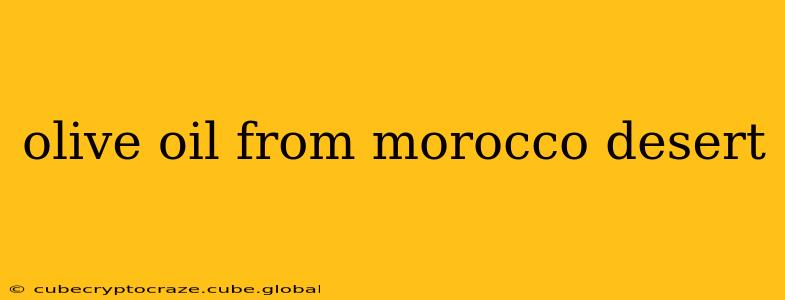Morocco, a land of vibrant culture and diverse landscapes, boasts a unique olive oil story, particularly in its arid desert regions. While not directly from the Sahara Desert itself (olive trees require more water than the desert provides), high-quality olive oil production flourishes in the semi-arid regions bordering the desert, often utilizing traditional methods and benefiting from the unique terroir. This article delves into the fascinating world of Moroccan desert olive oil, exploring its production, characteristics, and the cultural significance it holds.
What makes Moroccan desert olive oil unique?
The uniqueness of Moroccan olive oil, especially that produced near the desert, stems from a combination of factors:
-
Terroir: The semi-arid climate, with its intense sunlight and fluctuating temperatures, imparts a distinct flavor profile to the olives. These conditions often result in olives with higher antioxidant levels and a more intense, complex taste. The mineral-rich soil also contributes to the oil's unique characteristics.
-
Traditional Methods: Many producers in these regions still adhere to traditional olive oil production techniques, minimizing industrial processing and preserving the oil's natural qualities. This often involves hand-picking olives and using traditional presses.
-
Olive Varieties: Morocco cultivates a wide variety of olive cultivars, each contributing its own unique flavor notes to the final product. Some varieties are particularly well-suited to the harsher conditions of the semi-arid climate.
-
Sustainability Concerns: Water scarcity is a critical concern in these areas, leading many producers to adopt sustainable farming practices to conserve water and protect the environment.
Is Moroccan olive oil better than other olive oils?
The quality of olive oil depends on numerous factors, including the olive variety, cultivation practices, and processing methods. While Moroccan olive oil, particularly from the regions bordering the desert, is often praised for its intense flavor and high antioxidant content, it's inaccurate to claim it's definitively "better" than all other olive oils. Other regions produce exceptional olive oils with their own unique characteristics and qualities. The "best" olive oil is ultimately a matter of personal preference.
What are the health benefits of Moroccan olive oil?
Moroccan olive oil, like other high-quality olive oils, is rich in monounsaturated fatty acids, particularly oleic acid, which is associated with numerous health benefits:
-
Heart Health: Oleic acid can help lower LDL ("bad") cholesterol and raise HDL ("good") cholesterol levels, reducing the risk of heart disease.
-
Antioxidant Properties: Olive oil is packed with antioxidants, which help protect cells from damage caused by free radicals.
-
Anti-inflammatory Effects: Some studies suggest that olive oil may have anti-inflammatory properties.
-
Improved Digestion: The healthy fats in olive oil can aid digestion.
It's important to note that these benefits are most pronounced when consuming extra virgin olive oil, which has undergone minimal processing.
Where can I buy authentic Moroccan desert olive oil?
Finding truly authentic Moroccan desert olive oil may require some research. Look for brands that specifically highlight the origin of their olives and detail their production methods. Specialty food stores, online retailers specializing in imported goods, and farmers' markets may be good sources. Be aware of potential imitations and prioritize brands with transparent sourcing information.
How is Moroccan olive oil used in cooking?
Moroccan olive oil’s robust flavor profile makes it ideal for various culinary applications:
-
Salad Dressings: Its strong flavor complements salads beautifully.
-
Dipping Oil: Enjoy it with crusty bread.
-
Finishing Oil: Drizzle it over finished dishes to add flavor and richness.
-
Baking: While its flavor might be overpowering in some baked goods, it can be used in certain recipes to enhance the taste.
-
Frying: While it has a relatively high smoke point, it's best used at lower temperatures for frying to preserve its flavor and nutritional benefits.
How can I tell if my Moroccan olive oil is real?
Several factors indicate authentic Moroccan olive oil:
-
Labeling: Check the label for accurate information regarding the origin, olive variety, and production methods. Look for certifications like "extra virgin" and indications of traditional pressing.
-
Taste and Aroma: High-quality olive oil should have a fruity aroma and a pleasant, peppery taste.
-
Color and Clarity: The color can vary depending on the olive variety, but it should be clear and free of sediment.
-
Source: Purchase from reputable sources that can provide evidence of the oil's origin and production process.
The rich history and unique characteristics of Moroccan desert olive oil make it a truly special product. By understanding its origins and appreciating its quality, you can enhance your culinary experiences and enjoy the numerous health benefits it offers.
